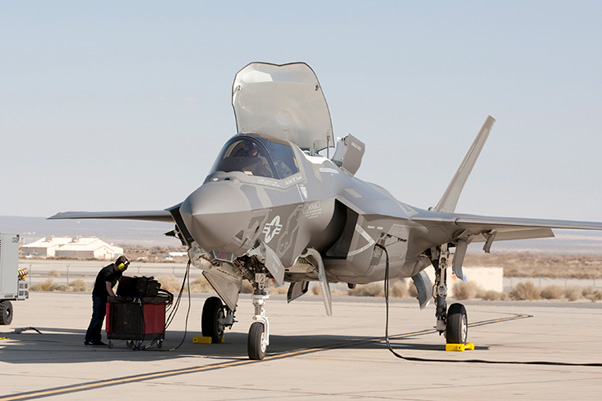The F-35 Lightning II Joint Program Office, in partnership with Lockheed Martin, fulfilled the next major milestone in the development of the Operational Data Integrated Network.
On Sept. 29, 2020, Marines at U.S. Marine Corps Air Station Yuma, Ariz., completed the loading of a single squadron of F-35Bs on new modernized ODIN hardware.
Later that day, the Marines flew the first flight supported by the new hardware and flew four more flights the following day. The new modern hardware is running the most current version of the Autonomic Logistics Information System and is designed to host future ODIN applications. Successful operation at Yuma validates the next-generation servers as a viable successor to the aging ALIS system and provides a significant performance upgrade to F-35 units.
“The Integrated Test Force at Edwards Air Force Base, Calif., and Naval Air Station Patuxent River, Md., were part of the Logistics Test and Evaluation event for the ODIN Base Kit executed at Pax River during Aug. 31-10 Sept. 10, before the OBK was shipped to Yuma for operational testing,” explained Mary Parker, deputy director for Logistics, F-35 ITF.
“The OBK hardware, with currently fielded ALIS Release 3.5.2.2 software, supported two weeks of live Flight Test operations with superb supportability evaluation results,” Parker added. “There was positive feedback from the maintainers on the flight line for the system speed of all ALIS applications.”
As was announced earlier this year, ODIN is the planned replacement for ALIS. ODIN is a cloud-native system that incorporates a new integrated data environment and a new suite of user-centered applications; it will be a significant step forward to improve F-35 fleet’s sustainment and readiness performance. ODIN is being designed to substantially decrease F-35 administrator and maintainer workload, increase mission capability rates for all F-35 variants, and allow software engineers to rapidly develop and deploy updates in response to emerging warfighter requirements.
“Different from ALIS, ODIN is an F-35 Joint Program Office-led effort leveraging government and industry partners such as Kessel Run, the 309th Software Engineering Group, Naval Information Warfare Center, Lockheed Martin, and Pratt and Whitney,” said Lt Gen Eric Fick, F-35 Program Executive Officer. “ODIN will leverage the agile software development and delivery practices piloted by Kessel Run and investments by Lockheed Martin to better posture our F-35 fleet to increase and maintain a high readiness rate in order to meet its operational requirements.”
ODIN’s new hardware brings numerous improvements to ALIS. Immediately obvious is its reduced size. While existing ALIS servers comprise of a full person-height rack of electronics and require additional backup power modules, the ODIN-enabled hardware fits within two transportable cases – roughly the size of two pieces of carry-on luggage. This smaller ‘footprint’ also brings significant weight reduction – from more than 800 lbs. for an ALIS server, to two modules each weighing under 70 lbs. for ODIN.
ODIN hardware also brings significant performance improvements while running ALIS. Performance testing of ODIN showed a reduction in the administrative workload and significantly reduced processing times compared to fielded ALIS servers (>50 percent decrease) – reducing the maintainers’ workload by making system interactions quicker. The testing also demonstrated a significant reduction in the time required to configure the system for use in a new environment and transfer aircraft.
“The Portable Memory Device (PMD) debrief time was twice as fast as the PMD Debrief on the ALIS deployable Squadron Operating Unit (SOUv2-Unclassified – aka the ALIS Server). There was a significant reduction in OBK hardware logistics footprint, with the OBK being one-quarter the size of the SOUv2-U,” Parker said. “There were favorable supportability results for the Integrated Product Support (IPS) measures. Overall, the limited Developmental Test and Evaluation (DT&E) of the OBK with one aircraft at PAX was very successful.”
The successful validation testing of the new ODIN hardware is an important step to delivering the modern maintenance and logistics system that F-35 operators and maintainers need.
Editor’s note: Giancarlo Casem contributed to this report.












